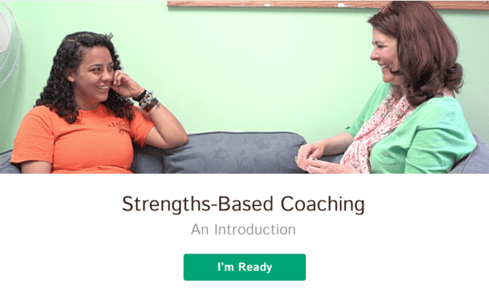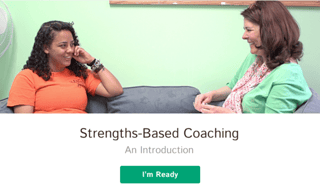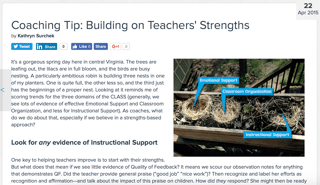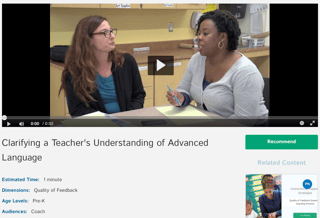
Coaches come from a wide variety of backgrounds, jobs, and educational experiences. You may have “coach” in your job title, use a specific coaching model, and have received formal coach-training; on the other hand, “coaching” may be a less official part of your role but you may often find yourself supporting teachers and colleagues.
Wherever you fall on the continuum of experiences, if you support teachers, then you could probably use a little support yourself as you strive to be the best mentor you can be.
Here is a list of common questions and concerns we hear from coaches, and some of our favorite myTeachstone resources that can help!
I’m new to coaching. How should I get started?
 Course series: Strengths-Based Coaching (15 min/course)
Course series: Strengths-Based Coaching (15 min/course) - Start with Strengths-Based Coaching: An Introduction
- Articles
“I’m fairly new to CLASS. How can I beef up my CLASS knowledge (or just refresh myself on a specific dimension)?”
- Course Series: Learn About [CLASS Dimension] (15 min/course)
- Start with the Learn About Positive Climate course, or use the search bar to find and work through more CLASS dimensions and age levels (available for Infant, Toddler, and Pre-K).
I feel pretty good about my CLASS knowledge, but I’m a little shaky on Instructional Support.
- Course Series: Instructional Support Strategies (15-20 min/course)
- Articles
- Videos
My teacher was just observed on the CLASS--what should I do next?
- Course series: Feedback Strategies (20 min/course)
- Start with Feedback Strategies: Score Sharing and Focus
- Articles
- Video
Strengths-based coaching sounds good in theory, but how can I apply this in a way that actually addresses what teachers need to improve?
 Course Series: Strengths-Based Coaching (15 min/course)
Course Series: Strengths-Based Coaching (15 min/course)
- Start with Strengths-based Coaching: An Introduction
- Articles
How can I use teacher data to individualize my support for teachers?
- Course Series: Using Data To Support Teachers (30-40 min/course)
- Start with: Using Data To Support Teachers: Teacher Surveys
- Article
I’m wearing two hats: director and coach. Help!
- Articles
We hope you’ll engage in these resources and apply what you learn to your coaching practice--but don’t stop here--there are many more coaching-focused resources in myTeachstone!
Did we miss any coaching challenges or fail to mention one of your favorite myTeachstone resources? Let us know. Join the CLASS Learning Community and start the discussion today.

 Concept Development Essentials: Defining the Dimension
Concept Development Essentials: Defining the Dimension